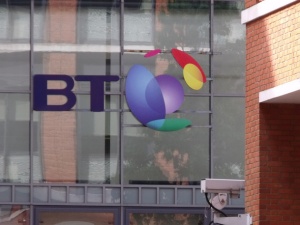BT profits rise 20 percent despite revenue drop

BT's latest quarterly results show a 20-percent rise in pre-tax profits, despite a drop in revenue that was largely down to people using their landlines less.

BT's takings have dipped because people are using their landlines less, but cuts to operating costs have meant a significant rise in profits. Photo credit: Ell Brown/Flickr
The profit boost, revealed on Thursday, was mostly the result of cuts in operating expenses and the cost of financing, the company said. Profits reached £533m for the first quarter of the 2011 financial year, up from £446m in 2010.
BT partly blamed its five-percent fall in revenue, down to £4.76bn for the quarter, on a 27-percent drop in transit revenue — the money it pulls in from charging other operators to connect calls to BT customers' landlines.
Investment in BT's super-fast fibre broadband network was another stand-out feature of the results. More than 200,000 customers are now using its Infinity super-fast services, and capital expenditure at BT Openreach was up seven percent year-on-year, reflecting investment in expanding the network.
"We grew profit before tax by 20 percent at the same time as investing in the future of the business," chief executive Ian Livingston said in a statement. "Our super-fast broadband network has now passed over five million premises and the customer base has almost trebled in the last six months."
Mobile termination rates
The drop in transit revenue was mainly caused by the cut in mobile termination rates (MTRs) — the amount operator A can charge operator B to have B's customers call A's customers — that Ofcom mandated in March. BT pulled in £79m less in the first financial quarter of this year than it did in the same period last year.
BT was one of the primary lobbyists trying to get MTRs brought down. This was because it cost a lot more for BT customers to call mobiles from their landlines than the other way round. The company's earnings indicate that this strategy paid off, but they also suggest that people are simply using their landlines less than they were a year ago.
"Payments to telecommunications operators were down 14 percent due to lower mobile termination rates and reduced transit and wholesale call volumes," BT said in its earnings report.
Other factors contributing to the drop in operating expenses included a drop in labour costs, down three percent year-on-year, and "further reductions across our other cost categories as the group continues to drive efficiency improvements", the company said.
A decline in voice revenue from business customers was offset by a growth in take-up of the company's IT services, BT added.
BT also noted that its total broadband customer base was 5.8 million as of 30 June. This represents a 37-percent share of the total DSL and local-loop unbundling (LLU) market of 16 million homes and businesses.
Get the latest technology news and analysis, blogs and reviews delivered directly to your inbox with ZDNet UK's newsletters.